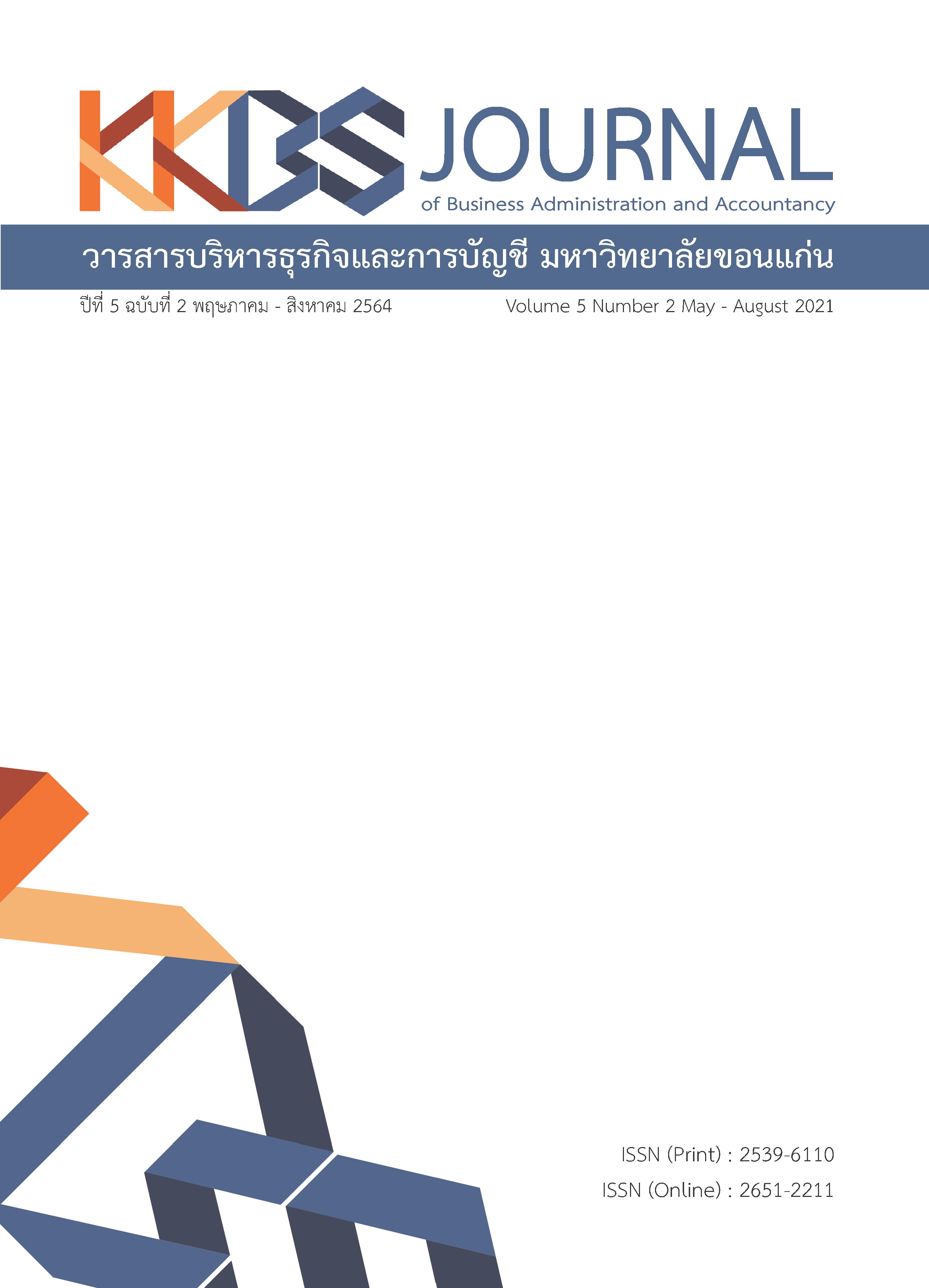Lifestyle: The Case of Generation Y and Generation Z in Khon Kaen
Main Article Content
Abstract
This research article the objective of this study is to study the lifestyle of Generation Y and Generation Z consumers. In order to understand the lifestyle Which influences consumers in choosing to consume products and services. Study results help entrepreneurs or marketers take advantage. In presenting products and services in accordance with the lifestyle of consumers. The sample group used in this study was 200 samples of Generation Y and Generation Z consumers in Khon Kaen Province, a total of 400 samples. Data were collected by means of questionnaires. The data were analyzed by using percentage, frequency, mean, standard deviation and Exploratory Factor Analysis. The results of the study showed that Generation Y consumers had 5 component and the Generation Z consumers had 4 components.
Article Details
The articles published in the journals are the authors' opinions, not the opinion of the editorial team or administrative staff. The articles published is copyright of the Journal of Business Administration and Accounting, Khon Kaen University.
References
Anuratpanich, L. (2016). Gen X Gen Y Gen Z. Mahidol University. (In Thai)
Assael, H. (1995). Consumer behavior and marketing action. 5th ed. Cincinnati: South-Western College.
Chevharunothai, W. (2012). Generation Z with love and care. Bangkok: Thanbooks. (In Thai)
Cranston, B. (2008). Talkin’ bout their Generations. B + T Weekly, May 2, 10-11.
Economic Intelligence Center. (2017). Insight strategies to attract consumers. (In Thai)
Intharawirath, B. (2014). Study of gen Y consumer behavior in online shopping Bangkok and surrounding areas. Bangkok: Dhurakij Pundit University. (In Thai)
Kamonsupajindha, K. (2014). Generation's social media use and identity: A case study of the differences between generation baby boomers and generation Y. Bangkok: Bangkok University. (In Thai)
Hole, D. Zhong, L. & Schwartz, J. (2010). Talking about whose generation: Why western generation models can’t account for a global workforce. In On Talent, The Talent Paradox: A 21st Century talent and leadership agenda. (pp.98-107). Deloitte: Deloitte University Pr.
Humphrey, B. & Stokes, J. (2000). The 21st century supervisor: Nine essential skills for frontline leaders. San Francisco: Jossey-Bass/Pfeiffer.
Jayson, S. (2013). Aging in America: Five do's as age wave bears down on the USA. Retrieved from www.usatoday.com
Jaturungkakul, A. (2007). Consumer behavior. 2nd ed. Bangkok: Thammasat University Press. (In Thai)
Kanjanawasri, S. 2011. Evaluation theory. 8th ed. Bangkok: Chulalongkorn University Press. (In Thai)
Kopanicova, J. & Klepochova, D. (2016). Consumer in new millennium: Attitudes towards adoption of new technologies in purchasing process. Studia Commercialia Bratislavensia, 9(33), 65-74.
Mannheim, K. (1952). The Sociological Problems of Generations. In P. Kecskemeti (Ed.), Essays on the Sociology of Knowledge. (pp. 163-195). New York: Oxford University Press.
Meesiri, J. (2012). Marketing mix factor and life styles affecting client intention on the DTV satellite dish in Bangkok and suburb Area. Bangkok: Bangkok University.
Nokchan, N. (2012). The comparison of the working motivation of generation X personnel and generation Y personnel: Study a specific case for employees of the provincial electricity authority. Chandrakasemsarn Journal, 18(34), 91-97. (In Thai)
Pongwiritthon, R. & Utama-Ang, S. (2013). Lifestyle pattern of the householder towards the village development according to the sufficiency economy philosophy of the Royal Agricultural Station Pang Da. Chiang Mai: Rajamangala University of Technology Lanna. (In Thai)
Rosen, G. (2010). Metaphysical dependence: Grounding and reduction. In Bob Hale & Aviv Hoffmann, (eds.). Modality: metaphysics, logic, and epistemology. (pp. 109-136). Oxford: Oxford University Press.
Smith, J.W. & Clurman, A. (1997). Rocking the ages: The Yankelovich report on generational marketing. New York: HarperBusiness.
Silapajaru, T. (2017). Research and analysis of statistical data by SPSS and AMOS. Bangkok: V Interprint. (In Thai)
Siriwan, U. (2012). Digital marketing trend 2012. Retrieved December 11, 2020, from https://www.druthit.com/
Solomon, L.J. & Rothblum, E.D. (1994). Procrastination assessment scale- students (PASS). In J. Fischer & K. Corcoran (Eds.). Measures for clinical practice. (pp.446-452). New York: The Free Press.
Strid, A. & Tan, K. (2003). Bulbous and tuberous plants of Greece. Bocconea, 16(2), 757-762.
Takotoshi, I. (2004). Generativity as social responsibility: The role of generations in social continuity and change. Retrieved from http://Psycnet.apa.org/books/10622/006
Tapscott, D. (2009). Grown up digital: How the next generation is changing the world. New York: McGraw Hill.
Vinken, B. (2004). Fashion zeitgeist: Trends and cycles in the fashion system. London: Bloomsbury Pub.
Wanichphan, K. (2013). Lifestyle and Personality trait of Generation X and Y consumers when deciding to buy fashion products online. Bangkok: Bangkok University. (In Thai)
Wells, E.C. (2008). Sustaining Gen Y’s interests. Today’s Garden Center, 1, 34-37.
Withawat-Olan, S. (2007). Gen Y: How to work. Bangkok: Business World. (In Thai)
Wellner, A.S. (2000). Generation Z. American Demographics, 22(9), 60-65.
Wilson, M. & Field, K. (2007). Defining gen Y. Chain Store Age, 83(3), 35-45.


